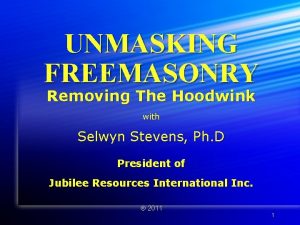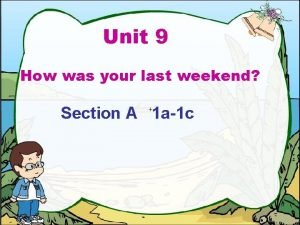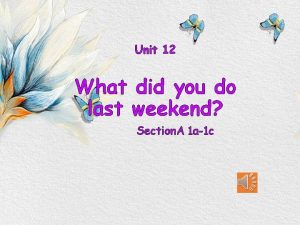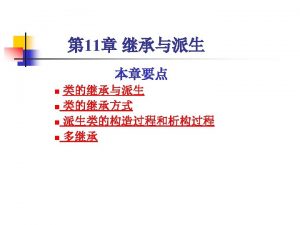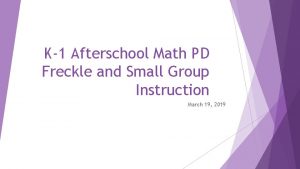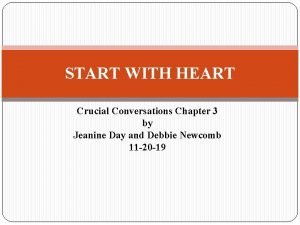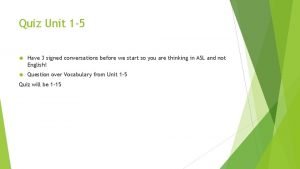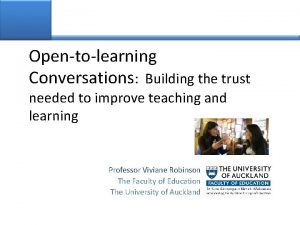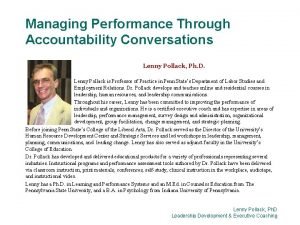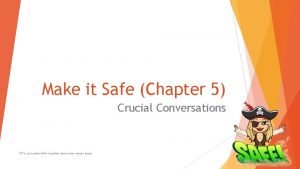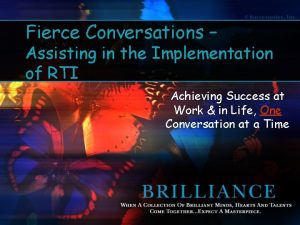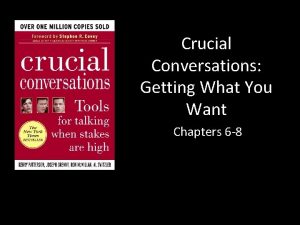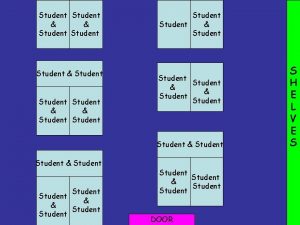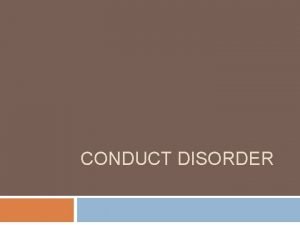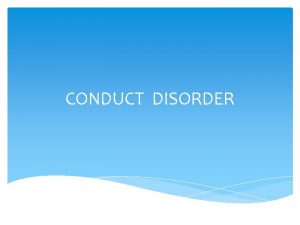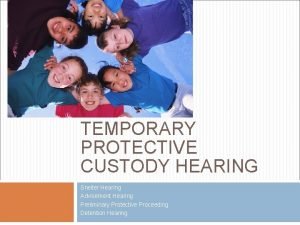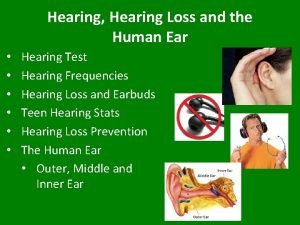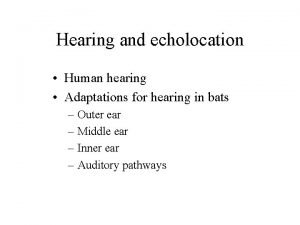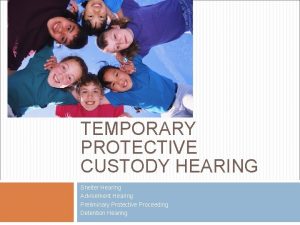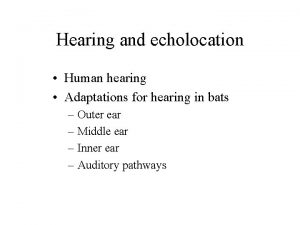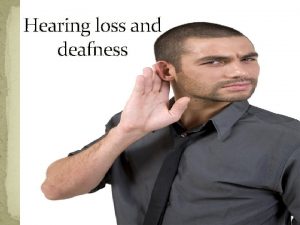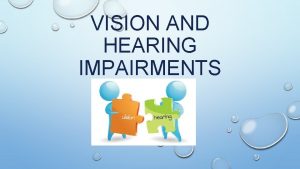Transforming conversations UNMASKING your student conduct hearing MACHUO


















- Slides: 18

Transforming conversations: UNMASKING your student conduct hearing MACHUO 2011 William S. Bordak (Bill) Assistant Director Office of Community Standards Saint Joseph’s University Shondrika Merritt Residential Area Manager Office of Residence Life Saint Joseph’s University

Our Agenda • • • Session Overview SJU Background and Community Standards Transformative Learning Goals (TLGs) Foundations of a Developmental Conversation Case Studies Action Planning

About SJU… • Catholic and Jesuit university • Campus – 103 acres in western Philadelphia and Montgomery County; 78 buildings • Enrollment (2010 -11 academic year) – 8, 800 total in all programs – 4, 600 traditional undergraduates

About SJU… • Our Students – 51% female, 49% male – 58% of traditional full-time students reside on campus • Our Collaboration – The Office of Community Standards and the Office of Residence Life work closely regarding incidents both on and off campus. • Our Issues – Alcohol (33% high risk), Drugs (pot, prescription meds), and the usual suspects! – Off campus parties!

About SJU… • Community Standards Process – All reports are reviewed and assigned a hearing officer or board by the Office of Community Standards. • • • Residence Life Professionals (7) Office of Community Standards Professionals (3) Peer Review Board Community Standards Board Alternative Resolutions – Average Res Life Prof case load last year: 74 cases – Community Standards, Residence Life, Wellness Educator, and Security meet every Monday!

What is your mission? • Jesuit educational vision of "concern for the individual student" (cura personalis). • Engage in work that supports the transformative learning of students: – – – Development of faith and spiritual awareness Appreciation of diversity Realization of a satisfying and productive lifestyle Practice of servant leadership focused on social justice Discernment of personal, educational, and professional goals s ’ G L T

Foundations of a Developmental Hearing Robert Kegan – Evolution of Consciousness (5 Stages) A way to understand differences in adult behavior, this theory is not primarily based on intelligence. It describes a specific way of making sense of our environment, including relationships and responsibilities. Arthur Chickering – Identity Development Theory (7 Vectors) 7 vectors of development; cyclical instead of linear – students may experience multiple vectors at the same time or students may experience one vector multiple times in different ways. William Perry: Forms of Intellectual and Ethical Development in the College Years How students respond to learning and knowledge, a stage model illustrating how students move from simple, “black and white” thoughts to more complex, integrated systemic thought

Foundations of a Developmental Hearing Robert Kegan – Evolution of Consciousness (5 Stages) A way to understand differences in adult behavior, this theory is not primarily based on intelligence. It describes a specific way of making sense of our environment, including relationships and responsibilities. Arthur Chickering – Identity Development Theory (7 Vectors) 7 vectors of development; cyclical instead of linear – students may experience multiple vectors at the same time or students may experience one vector multiple times in different ways. William Perry: Forms of Intellectual and Ethical Development in the College Years How students respond to learning and knowledge, a stage model illustrating how students move from simple, “black and white” thoughts to more complex, integrated systemic thought. Before the hearing Know the purpose of having a hearing/Behavioral conference? • Being developmental means the hearing process should be educational and creates “holding environments”. • Education includes: Accountability, Challenging, supporting and decision making Making sure the environment is comfortable and conducive to challenging and intimate conversations.

Foundations of a Developmental Hearing Robert Kegan – Evolution of Consciousness (5 Stages) A way to understand differences in adult behavior, this theory is not primarily based on intelligence. It describes a specific way of making sense of our environment, including relationships and responsibilities. Arthur Chickering – Identity Development Theory (7 Vectors) 7 vectors of development; cyclical instead of linear – students may experience multiple vectors at the same time or students may experience one vector multiple times in different ways. William Perry: Forms of Intellectual and Ethical Development in the College Years How students respond to learning and knowledge, a stage model illustrating how students move from simple, “black and white” thoughts to more complex, integrated systemic thought. During the hearing Explain the process and your role • Your name, title and any other “legal” jargon • This is a hearing, but it is also a conversation between two individuals

Foundations of a Developmental Hearing Robert Kegan – Evolution of Consciousness (5 Stages) A way to understand differences in adult behavior, this theory is not primarily based on intelligence. It describes a specific way of making sense of our environment, including relationships and responsibilities. Arthur Chickering – Identity Development Theory (7 Vectors) 7 vectors of development; cyclical instead of linear – students may experience multiple vectors at the same time or students may experience one vector multiple times in different ways. William Perry: Forms of Intellectual and Ethical Development in the College Years How students respond to learning and knowledge, a stage model illustrating how students move from simple, “black and white” thoughts to more complex, integrated systemic thought. Questioning and conversation Build Rapport with student/ make a connection (authentically)-Holding Environments • How is your first year at …. going? • I see you are involved in……how’s that? “The level of development cannot always be determined from actions, but from the reasons for and thought-process behind those actions. ” The hearing is not just about investigating if a person is responsible or not responsible. It is about self- reflection and making change.

Foundations of a Developmental Hearing Robert Kegan – Evolution of Consciousness (5 Stages) A way to understand differences in adult behavior, this theory is not primarily based on intelligence. It describes a specific way of making sense of our environment, including relationships and responsibilities. Arthur Chickering – Identity Development Theory (7 Vectors) 7 vectors of development; cyclical instead of linear – students may experience multiple vectors at the same time or students may experience one vector multiple times in different ways. William Perry: Forms of Intellectual and Ethical Development in the College Years How students respond to learning and knowledge, a stage model illustrating how students move from simple, “black and white” thoughts to more complex, integrated systemic thought. Questioning and conversation Acknowledge discomfort and nervous and encourage honesty. • You seem a little nervous why is that? • We at SJU value honesty don’t be afraid of telling the truth. Validation and acknowledgement of students experience • I can see how you could feel disrespected, but let’s talk about your actions. • I know it’s difficult being a freshman

Foundations of a Developmental Hearing Robert Kegan – Evolution of Consciousness (5 Stages) A way to understand differences in adult behavior, this theory is not primarily based on intelligence. It describes a specific way of making sense of our environment, including relationships and responsibilities. Arthur Chickering – Identity Development Theory (7 Vectors) 7 vectors of development; cyclical instead of linear – students may experience multiple vectors at the same time or students may experience one vector multiple times in different ways. William Perry: Forms of Intellectual and Ethical Development in the College Years How students respond to learning and knowledge, a stage model illustrating how students move from simple, “black and white” thoughts to more complex, integrated systemic thought. Questioning and conversation Ask reflective and open ended questions (do not talk more than student). Don’t be afraid to ask the HARD questions • What was going on during this incident? • What are some things you could have done differently? • Was this incident a reflection of your character? • Who else does your actions in this incident impact? • Ask if there was anything learned from the incident. Why or Why not?

Foundations of a Developmental Hearing Robert Kegan – Evolution of Consciousness (5 Stages) A way to understand differences in adult behavior, this theory is not primarily based on intelligence. It describes a specific way of making sense of our environment, including relationships and responsibilities. Arthur Chickering – Identity Development Theory (7 Vectors) 7 vectors of development; cyclical instead of linear – students may experience multiple vectors at the same time or students may experience one vector multiple times in different ways. William Perry: Forms of Intellectual and Ethical Development in the College Years How students respond to learning and knowledge, a stage model illustrating how students move from simple, “black and white” thoughts to more complex, integrated systemic thought. Questioning and conversation Challenge the resistant student. • Why do you believe you are here? • Why are you so angry/upset/suspicious?

Foundations of a Developmental Hearing Robert Kegan – Evolution of Consciousness (5 Stages) A way to understand differences in adult behavior, this theory is not primarily based on intelligence. It describes a specific way of making sense of our environment, including relationships and responsibilities. Arthur Chickering – Identity Development Theory (7 Vectors) 7 vectors of development; cyclical instead of linear – students may experience multiple vectors at the same time or students may experience one vector multiple times in different ways. William Perry: Forms of Intellectual and Ethical Development in the College Years How students respond to learning and knowledge, a stage model illustrating how students move from simple, “black and white” thoughts to more complex, integrated systemic thought. Ending the Conversation Have you asked all the “right”? • Are you in a good position to make a decision? • Are they responsible, not responsible? • Are you in a position to know how to adequately help them? • Can your sanctions be intentional? • Do you know a resource that can be helpful?

Case Study At Approximately 9: 20 pm on September 30 th, RAs Simone and John were doing rounds through Toby Hall when they noticed three penises drawn on the door of Toby 450. RA Simone proceeded to call public safety. At this time, the RAs noticed Resident Jacob of the room open his door and say "what is this, who drew penises on my door? " with a chuckle. The Ra’s then questioned resident Jacob as to who would draw the image; the resident after some time admitted that he had drawn the images. The RAs then let the resident know that public safety was going to take pictures of the incident. . Public safety took pictures and left. The RAs let the resident know he was allowed to erase his whiteboards, and left the hall. Additional Information: Jacob is very resistant in the hearing, doesn’t see the big deal in a drawing that could be erased. He said it was just “boys being boys”.

Case Study I, RA Susan while on rounds walked onto the 4 th floor of Morgan Hall and heard loud music, as I walked towards room 406 I heard very derogatory words (rap lyrics). I knocked on the door and the music was turned down. Booker opened the door, Mark was sitting on the couch and Justin was sitting in a chair in the living room. I told them their music was too loud and degrading towards women. Justin said “Sorry”. While standing outside the door I heard from inside the room “That bitch isn’t our RA” “Who does that bitch thinks she is” and “that bitch is just mad because she can’t get any”. I then decided to ask the RA Rickie of the floor to accompany me to the room. I knocked on the door and resident Booker appeared again. I then explained to them again that the music was inappropriate and that when I walked out I heard them talking about me. Justin then walked into the living room from the hallway and started questioning why I was upset. Justin then began to question why they were not allowed to play the music. He said “If our neighbors are not complaining about the lyrics why does it matter? ” I replied “at St. Joe’s you agree to live in a community where everyone can feel safe”. I then informed them that this was being documented and left the room. Additional information: All residents in this incident are Division 1 athletes, Booker and Mark are both African American and Justin is European American

Case Study RA Christina was doing rounds on the first floor A-side of Merion Gardens. RA Christina walked past room A-107, and heard loud music. RA Christina knocked on the door three times before it was answered, and was greeted by Samuel. RA CHRISTINA asked to enter the apartment and Samuel opened the door. RA Christina walked into the living room where Samuel's roommate Kevin was and observed an open bottle of Corona on the living room table. RA CHRISTINA asked Kevin to open the fridge and freezer. There were 8 bottles of Corona in the fridge, two opened Coronas on the kitchen counter, and 2 handles of Vodka (Blue Wave & Fris Vodka) in the freezer. RA CHRISTINA went to note the alcohol in the room when Kevin hid the bottle of Blue Wave. RA CHRISTINA asked Samuel to open the cabinets and recovered the second bottle of Vodka that was hidden. Then, RA CHRISTINA called RA CJ for assistance. RA CJ came to the room and called Public Safety to pick up the alcohol. The Public Safety officer in the lobby responded first and he made a report of the alcohol in the room and called for someone to pick it up. While waiting for the second public safety officer, Kevin said: “this is nothing, we got written up last year for 6 handles of Vodka. " Furthermore, Samuel said: “Yeah, I don't even have my license in Pennsylvania anymore. " The second Public Safety Officer responded, and the alcohol was confiscated without further incident. Additional information: Students were very honest in the hearing admitted to everything in the report. Students continue to state that they were being “stupid” in this incident and that they would never drink again.

Action Plan • What have you learned today that you will use during your conversations with students? • Are there any obstacles to this action plan?
 Unmasking procedures
Unmasking procedures Unmasking freemasonry
Unmasking freemasonry Give us your hungry your tired your poor
Give us your hungry your tired your poor Tell me about your last weekend
Tell me about your last weekend We ...... a big piece of wood last saturday. (see)
We ...... a big piece of wood last saturday. (see) National student clearinghouse student tracker
National student clearinghouse student tracker Class maths student student1 class student string name
Class maths student student1 class student string name National student clearinghouse student tracker
National student clearinghouse student tracker Https://student.freckle.com/
Https://student.freckle.com/ Teacher
Teacher Sls singapore student learning space
Sls singapore student learning space Crucial conversations start with heart
Crucial conversations start with heart Constructive structure in asl
Constructive structure in asl Open to learning conversations viviane robinson
Open to learning conversations viviane robinson Accountability conversations
Accountability conversations Crucial conversations chapter 5
Crucial conversations chapter 5 Fierce conversations 7 principles
Fierce conversations 7 principles Talk tentatively
Talk tentatively Crucial conversations chapter 6 summary
Crucial conversations chapter 6 summary

